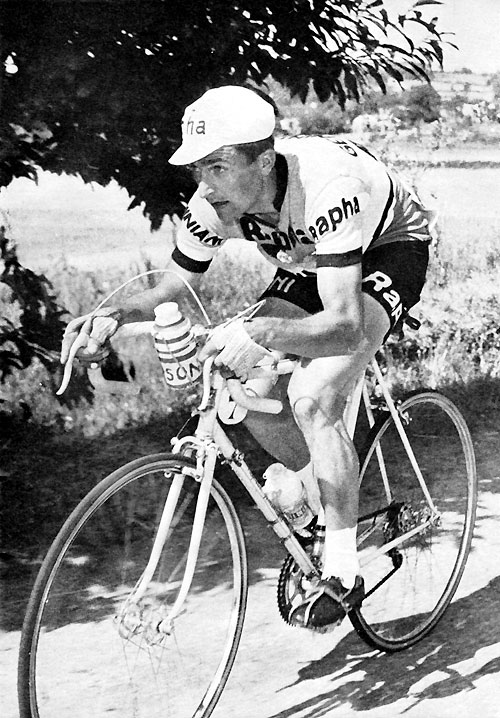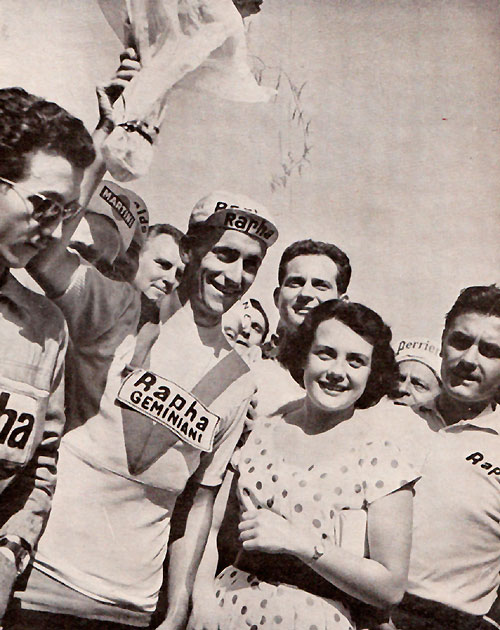1959 Tour de l’Ouest |
|
British cyclists were thrilled at Tom Simpson’s fourth place in the world professional road championship. Here is the story of his first contacts with the stars in a stage race. It is told by Rene de Latour - Coureur Sporting Cyclist November 1959 |
|
|
It was a good beginning, but it did not go to Simpson's head : " Some of the big riders didn't move a finger," he said. " Maybe tomorrow they will kill us." Next day, from Le Mans to Nantes was, again, uneventful in the main. Not one real gap was opened, and the culprit for this was an invisible but ever-present opponent-the wind. In fact, any attack would have been in the nature of suicide, and so near enough the whole bunch sprinted on the concrete track at Nantes. Of course Van Steenbergen was there, and many had already written him down as the winner before the sprint started ! But Rik was not at his best yet, and he had to leave the honours to Everaert, with Dutch trackman Captein second. Simpson finished equal 7th in the big sprint. Up in his room, after the massage, and reading the official race bulletin, Simpson had reason to be satisfied. He was in fourth position on 1, general," not a bit tired, and ready to do better still. On the way to Lorient, the big port, the race once again was "dull," but Simpson was one of those who tried to liven it up. But if it were uneventful, believe me, it was not slow. And when Pierre Barbotin - whom you will remember as Louison Bobet's " lieutenant " a few years ago - had to climb into the sag wagon, it was proof that the Tour de I'Ouest was not as easy as some journalists thought and wrote. With increasing confidence in his ability, Simpson this time had a go in the sprint on the Lorient velodrome, and only two men managed to show him the way to the tape : Rik Van Steenbergen and Everaert. Among those who were now very impressed by the qualities of Simpson, was Van Steenbergen himself. " I have been watching that boy carefully," Rik told me. " I should say he has a good future ahead of him. He sprints well, and when he does his relay at the front of the field, it is easy to see he is a good pursuit rider, too." That was praise indeed, for Rik above all people knows the meaning of the word "class" and never gives this kind of opinion just for the sake of being generous. That third also put Simpson in second place on general classification. Of course, with such bunch finishes, the "difference" in time of the first 20 or so was very small, and Tom was second on account of his good points placings-and the 42 seconds gained on the first day. With a bit of luck he could take over the race leadership, a thing which only one other Englishman (Robinson in the 1955 Six Provinces) had done in a classic West European stage race. " I'm going to have a go today," he confided on the starting line at Lorient. And at Quimper he succeeded. None of his Geminiani team-mates made it easy for him in any way but Simpson had so much strength to spare that, when he broke away from the main bunch in pursuit of the already-escaped Sweeck (whom you know well in England) and Bihannic, his effort was so powerful that race leader Everaert could do nothing about it. Sweeck and Bihannic were already three minutes ahead when Tom made his effort. With him were Scribante, Geneste and Mathys, but for every 100 metres they did at the front, Simpson did half a mile and much faster, too! This performance really impressed the whole Tour de l’Ouest personnel - riders, officials, organisers, everybody. Simpson had been tipped as the " dark horse " of the time trial stage, and had been expected to take things easily on the eve of the contre la montre. Instead he had brought off a feat of the greatest athletic quality. . . . But Simpson hadn't given up hopes of doing well in the time trial, too. It was to be held in the afternoon, following a short morning mass start stage. " Don't look for me in the morning," Tom grinned. " But I may win again this afternoon." This was more than a promise. He was comfortably hidden in the bunch at Brest at the finish of the first half. Then, in the afternoon, over the 26 hilly miles of a circuit, he put up probably the best effort of his career to win at the amazing speed of 44 k.p.h., his actual time being 56 min. 54 sec. Shay Elliott will tell you all about that ride-he started three minutes in front of Simpson and was caught and dropped before the half-way stage. And the danger man, Forestier, was beaten by 1 min. 50 secs. This put Simpson even further into the lead on general classification, and for most of us, he was the winner of the Tour de I'Ouest with four more days to go. Clearly a man who could ride such a time trial was the strongest in the race, to be feared by his opponents, and protected by his team-mates. But, alas, stage races are full of pit-falls, of treacheries even. On the next stage, which finished at Saint Brieuc, the town that had adopted him and whose sporting fans were waiting to greet him like a hero-on the road to Saint Brieuc 'the young Englishman was let down. It was hot, a long stage, so why worry about a gap that could be mastered at any time? A few other riders then went, too. Wouldn't it now be wise to make an effort, too? That was what Tom thought. But, said his team-mates, there was no real danger. Don't you worry, Tom," they said. " Even if Morvan does take the jersey, you can get it back again tomorrow or the day after. You are the strongest of the lot." But ahead, the three "nobodies” rode steadily away from the unfortunate Simpson's group (Morvan, of course, having not led during that time) and built up a big lead. So big, in fact, that on the road Morvan became race leader. It was then that Morvan was authorised by his directeur sportif to lead, and when Simpson arrived at Saint Brieuc, a new race leader's jersey was already on Morvan's shoulders. . . . And Simpson was five minutes behind him on total time! There was still three days to go, but his chance of winning got thinner and thinner. Morvan is not one of the top riders of France, but there is not much he has to learn about road tactics. After a good career on the roads of Britanny he is due to retire at the end of this year, and there he was leader of the race he had tried to win on five previous occasions. He was unwilling to abandon his position of privilege, for which he had worked a hundred times less than poor Simpson. "Nobody deserves to win this race more than Simpson," the other riders admitted. " But this is often how things go in a stage race." Then, on the last day as the first, Schoubben was the winner after a very fast last 20 miles, when Van Steenbergen put in some nice team work to protect his team-mate Schoubben when De Caboteer tried to get up with Schoubben. And so, Simpson finished 18th in the Tour de I'Ouest, in which he had won two stages, finished third on two occasions, and should - in the opinion of the majority of the followers - have won the race. It would be wrong to pretend that Simpson was not sore at the end of the Tour. He knew he had been wrong to listen to those who persuaded him that it was normal to abandon his leadership when he could have saved it with the help of his team. We have a saying in France : "Il faut etre prix pour etre appris." In other words, you must be a victim before you know the ropes. Be sure that Tom Simpson will not be caught again - and yet he has still a lot to learn. He is inclined to work far too hard, but that is a fault which the public loves. In England, perhaps, you were surprised to find him finishing fourth behind Darrigade, Gismondi and Fore in the world professional road championship. But it did not surprise those of us who saw him on the roads of Western France. By the way, I have not called Simpson a Yorkshireman. He told me he was born in County Durham, and the village where he has lived in recent years is 700 yards inside Nottinghamshire. " With Robinson, Sutton and Beryl Burton, Yorkshire has enough riders without my help," he says. |
|
|



 The Tour Simpson Should Not Have Lost
The Tour Simpson Should Not Have Lost The first stage was quite long, 247 kilometres. Not too hilly, but difficult enough to make a rider glad it was over. On paper, though, from the reporters point of view, not a lot happened. But when anything did happen, then Simpson was involved! He had been away in a break with Hendricks, Milesi and Wasko, which eventually came to nothing. Then, just four miles from the finish at Le Mans, he was away with another ten riders, and the group sprinted it out with 42 seconds lead over the bunch. Up the long straight I could see Tom's thin silhouette sprinting it out, only to be beaten into third place by Schoubben and the Dutch rider Stolker.
The first stage was quite long, 247 kilometres. Not too hilly, but difficult enough to make a rider glad it was over. On paper, though, from the reporters point of view, not a lot happened. But when anything did happen, then Simpson was involved! He had been away in a break with Hendricks, Milesi and Wasko, which eventually came to nothing. Then, just four miles from the finish at Le Mans, he was away with another ten riders, and the group sprinted it out with 42 seconds lead over the bunch. Up the long straight I could see Tom's thin silhouette sprinting it out, only to be beaten into third place by Schoubben and the Dutch rider Stolker.


